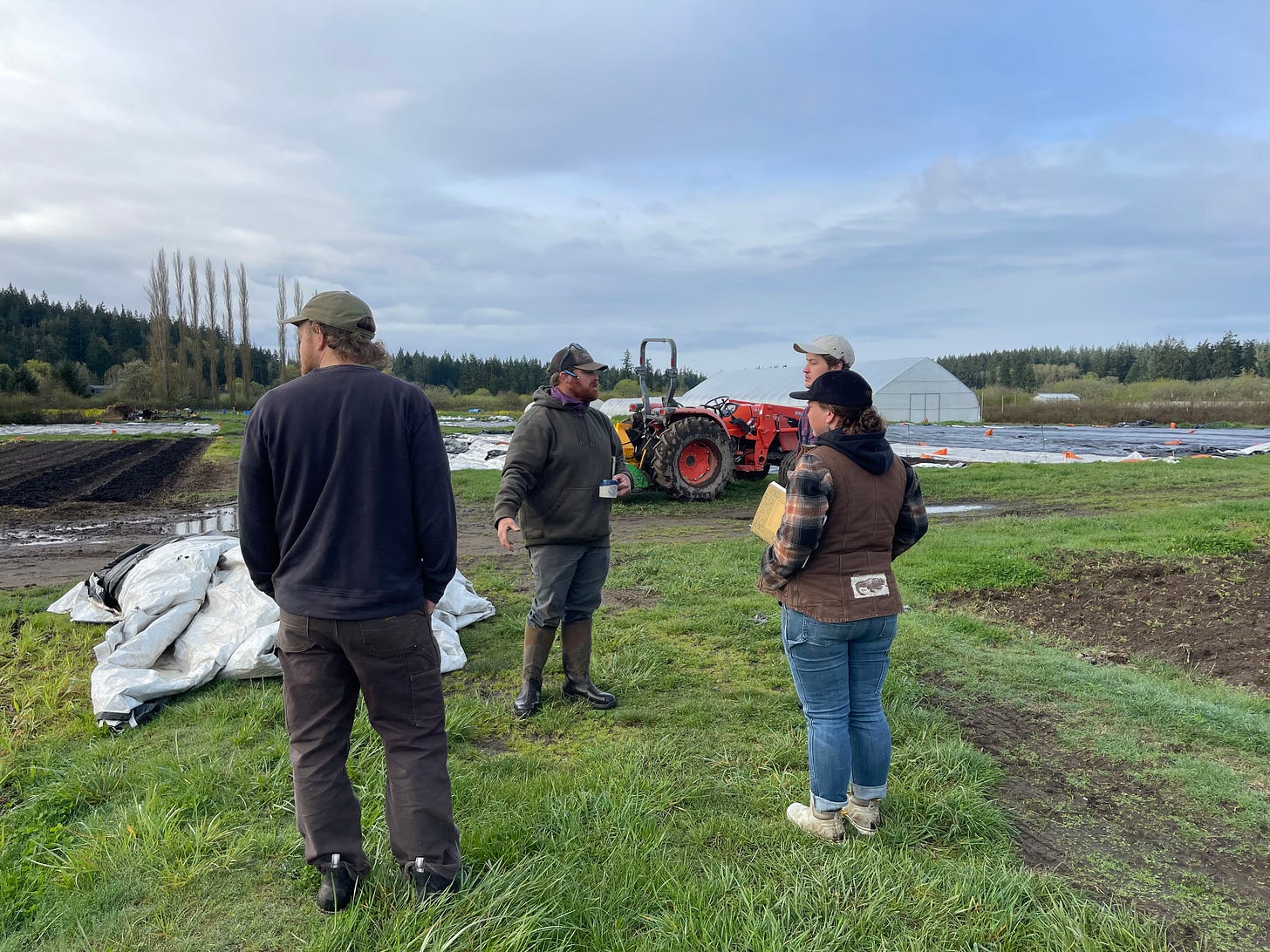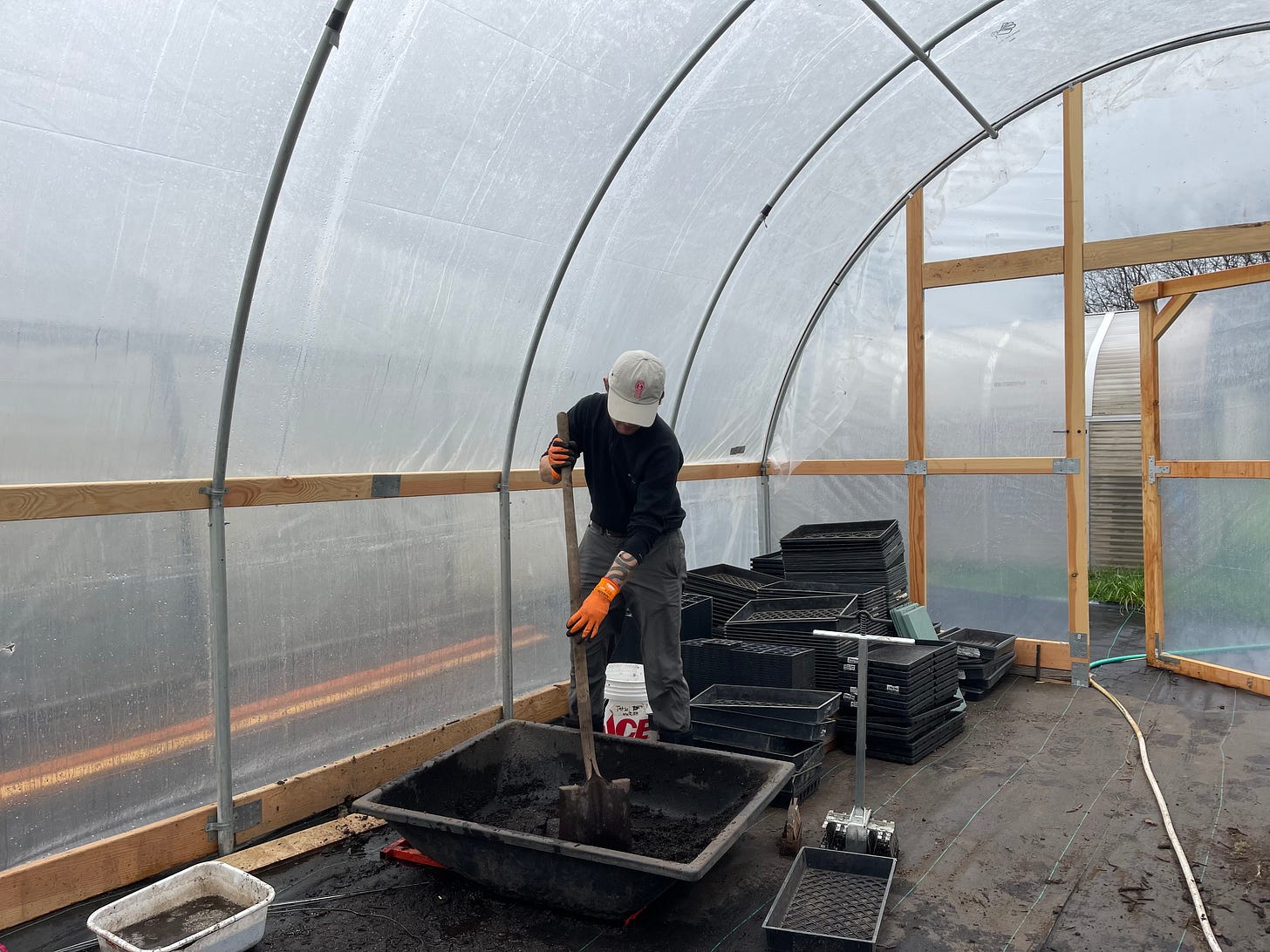Valuable, compared to being VALUED
This week marks my 14th “first week” at the Organic Farm School…the week we begin a new season. No two have ever been the same. Some might say that this is because we’re still figuring ourselves out as a farmer training program, and to an extent, that’s true. But I would say Americans are still figuring out if they value farmers and community access to food, or if they just want “cheap food.” The puzzlement around that question drives the economic constraints that cause us to persistently adjust our approach to training.
We know, because we’ve lived it, that community access to fresh, nutrient dense food is important. Especially in times of stress and/or supply chain issues. (Local farmers had some of their best years during Covid.) We know, because community scaled farms provide such food, that farmers are valuable to communities. What remains to be seen though is….do communities actually value farmers?
In our early years we were committed to a future populated with community scaled farms, owned and managed by our graduates and others like them. We knew that well-prepared young farmers could grow enough diversity of vegetables to feed their friends, family, and neighbors — and that in doing so they would be stewarding land and soil and biodiversity. We thought communities would see the value in this work and the people doing it. We thought such farms could create livelihoods for the farmers because of community support.
Sadly, it turns out that is just not true, at least not often enough, and not now. We know how to prepare new farmers for production success…what we can’t do is prepare them for financial success in an economy that works against them. Community support in terms of enthusiasm for farm stands, CSAs, and farmers markets is great…but what about support for housing, health care, child care, etc as they literally put food on your plate? For young farmers striking out on their own, hurdles like the price per acre of farm land, cost of infrastructure and the permits to build it, start up expenses for seed and supplies, availability of equipment and repair, complexity of weather and climate, access to water and a local farm labor pool are but a few of the things tripping up their future. Thus our perpetual pursuit of an ethical, effective way to train people to feed us.
Farming is always a dance with uncertainty, but with each passing year, the range of uncertainties is widening. When will the first frost be? The last frost? How hot will the summers be? How cold will the springs be? Will potting soil be available in time for spring starts? Will chicken feed be available at a price beginning farmers can afford? Where will it come from and will there be tariffs involved? Will rain fall at the “right time?”
Will no-fee leases stay in place long enough for beginning farmers to get established, or will land holders be tempted to sell their open space for intensified residential development? Will neighbors have enough money to pay for fresh vegetables? Will people be able to travel to visit farms? In other words, the dance with uncertainty is moving from a waltz to a frenzied jig.
And yet, here we are. Just because something is hard does not mean it’s unimportant or a fool’s errand. Everyone eats. So we have re-invented ourselves once more. We’re shifting away from classroom learning (so many great virtual classrooms have emerged) and toward intense field management training. No more classes of 4-10 students paying tuition, instead we are focusing on 1-3 paid apprentices who pay only for their place in the season and an intensive on business planning. We embrace two-week to one-month experiences for those who are curious about farming and yet not ready to jump into the deep end. We have started a Farm Stay program for non-farmers who want to be closer to the food production life without stepping into it. We have our Whole Systems Kitchen for this who want to learn more about what it takes to grow the food on our plates, how that food is important for our bodies, and how to prepare it in seasonal fashion. We provide farm tours, and we host community potlucks.
As we begin this new season, we are doing everything we can to connect eaters with growers. That has to be at least part of the way forward.
In the meantime, the rains of spring persist. This morning, I listened to Jeff talking with Brooke, our new Apprentice, about how to evaluate when to work the soil and when to wait. They talked about how to time planting with soil temp so seeds germinate instead of rotting, how to anticipate heat and it’s impact on irrigation plans, how to use tarps to hold warmth in during the spring, and to burn out weeds in the summer. It was Brooke’s first, first day. I could imagine and sense the overload of information. And yet I could also sense his eagerness to learn how to manage it all.
We’ll do our part, because we’re good at it. We’re going to train him to work with complex systems. We’re going to teach him how to build a starter business plan. We’re going to prepare him for the hurdles. He’s going to learn. He’s going to step into management of a living system. He is going to be valuable.
Will communities do their part? Will he be valued? Will you support new farmers like him as if your life depends on it (because it kind of does, unless you are growing all of your own food). We’ll see…



